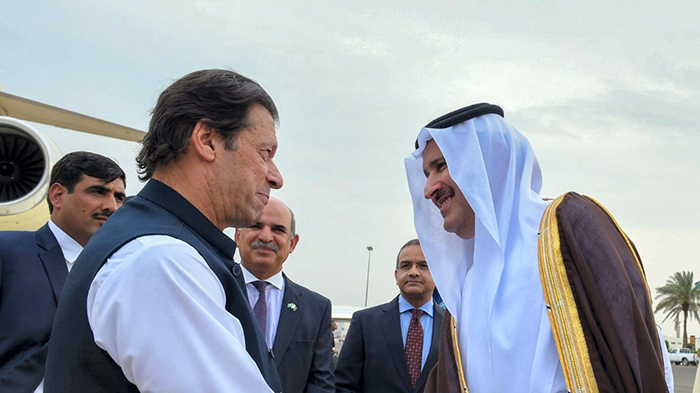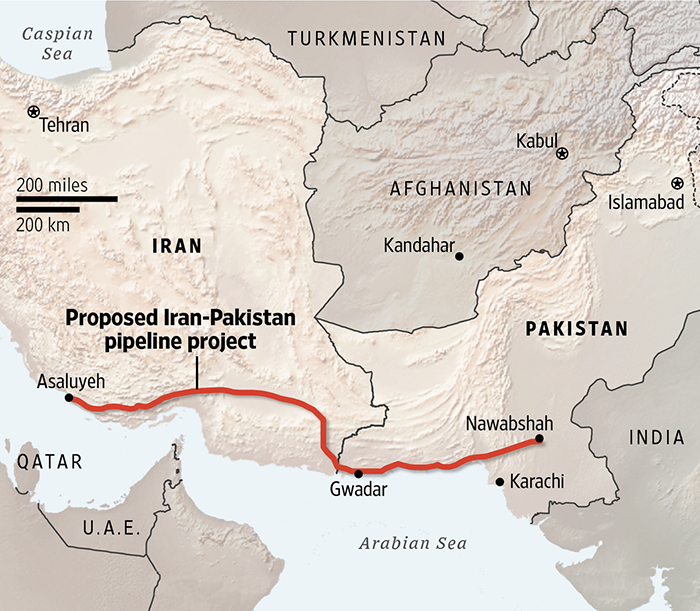China’s initiative is an important part of Pakistan’s future
 Zafar Bangash
Zafar Bangash
Nothing remains constant in life; change is inevitable. How people manage change determines whether the outcome would be positive or disastrous. This is also true in politics.
Pakistan stands at the threshold of major changes. There is a new government at the helm unencumbered by the slavish policies of past regimes: the Bhutto-Zardari combine and the (non)Sharifs. This is the time for Pakistan to wean itself away from America’s teats. Far from fortifying it, America’s breast milk has poisoned Pakistan’s body politic.
On the international scene, new power blocs have emerged challenging US hegemony. America is a has-been superpower. This is largely the result of aggressive US policies that have antagonized friend and foe alike. The three pillars of US hegemony were its soft power appeal manifested through Hollywood, the dollar, and its military might.
The US lost its soft power appeal long before 9/11 when it went totally rogue. The dollar has been losing ground to other currencies notably the Chinese yuan in recent years primarily because of unilateral sanctions against countries whose policies Washington does not like. Countries suffering US sanctions have entered into bilateral trade agreements with others. This is likely to become more widespread as US actions continue its irrational trajectory. And the US military has not won a single war since the Second World War (even that war was lost by Germany, not won by the Allies). This is hardly sterling performance for a military with the highest budget in the world, far exceeding the combined total of the next 10 countries!
Even at home the US is engulfed in a civil war-like situation where a moronic president, Donald Trump, is fighting everyone including his closest advisors. Bob Woodward’s latest book, Fear: Trump in the White House details the infighting in great detail. How long will it be before there are moves to impeach him? With the US in turmoil at home and faced with numerous military defeats abroad, it is time for Pakistan to reset its relations based on its own priorities and interests.
Eurasia is the new frontier that beckons. It is a land of opportunities and riches. China serves as the engine for this brave new world in the making. Russia, Turkey, and Islamic Iran are already on-board.
Pakistan needs to join it with enthusiasm. The new government led by Imran Khan, however, will face numerous internal hurdles. America’s agents among the Pakistani elite whether in politics, the bureaucracy, or media will create obstructions. They will resort to dirty tactics to create despondency. The signs are already visible. One only has to watch some of the television talk shows with anchors busy spreading doom and gloom.
Barely two weeks into Imran’s government, some TV anchors started to complain that he had provided no blueprint for how he planned to tackle the myriad problems facing the country. “He has no plan, only slogans,” they screamed from their television pulpits.
The new government has not even been fully briefed yet. Imran Khan had asked for 90 days to show results; that is what he promised during the election campaign but the TV talking heads are not interested in facts, only scoring cheap points. They even resorted to outright lies, hurling allegations that were quickly proved false. This is beneath contempt but it is expected from hired guns used to getting stuffed envelopes from earlier regimes to bark on their behalf, especially the one just ousted from power. Envelopes have stopped coming. It must be really painful, hence the loud screams.
But it is to foreign policy that we need to turn our attention. China has launched the “One Belt, One Road” policy, also called the Belt and Road Initiative (BRI). China plans to invest one trillion dollars (yes, that is trillion with a “t”) over the next decade or so building roads and ports and laying train tracks as well as building other infrastructure to enhance trade. Beijing describes it as the “connectivity project.” True, it connects China to the world but it also connects the world — at least the Eurasian countries — to each other.
The China Pakistan Economic Corridor (CPEC) is an important component of the BRI. While the overall investment amount is $50 to $60 billion, it holds enormous potential for China. Here is how. First, it cuts travel time for Chinese goods by 10 days to reach the port of Gwadar at the southern tip of Pakistan. Gwadar is the new gateway to the world and frees China from the long sea route that is susceptible to US and its allies’ disruptive tactics, especially Japan, Australia, and India. A recently opened train track from China to Iran’s Caspian Sea has cut travel time from 45 days to 15.
The US is propping up India through the Indo-Pacific Strategy framework to confront China. India’s US-assigned role was outlined in the 2017 National Security Strategy (NSS). As Alyssa Ayres candidly admitted in her “Expert Brief” for the Council on Foreign Relations on May 25, 2018,
While the NSS calls for working in concert with US allies and partners, including boosting ‘quadrilateral cooperation with Japan, Australia, and India,’ otherwise known as the Quad, the newly formulated strategy also welcomes India’s rise as a ‘leading global power’ and emphasizes expanded defense ties with New Delhi. Notably, the framework ap-pears focused on pulling India more intensively into regional activities to its east but does not necessarily take into account India’s own interests in the Indian Ocean [emphasis added].
This is an old strategy that the US used 50 years ago against the erstwhile Soviet Union by aligning with China. Interestingly, today China and Russia (successor to the Soviet Union) have developed a strategic partnership and are sending strong signals of their seriousness to confront US unilateralism and adventurism. This was underpinned by Russia and China holding the largest military exercises last month in Siberia. More than 300,000 troops were involved.
Pakistan needs to evolve a two-tier strategy: based on an inner rim and an outer rim. In the inner rim would be countries like Iran, China, and Turkey. Afghanistan could be brought in once the war ends there and some semblance of stability has been restored. The outer rim would comprise the Central Asian Republics, Russia, and countries of the Muslim East that are prepared to deal on the basis of equity and fairness.
It is in Pakistan’s interest to cultivate closer links with Islamic Iran. The two countries can learn from each other’s experiences and also share strategies for overcoming the threats and challenges they face. Pakistan should move quickly to restart the gas pipeline from Iran that has been kept in abeyance for seven years.
Both countries have a shared interest in confronting the threat of terrorism in Balochistan province. External powers, far and near, are instigating trouble in order to destabilize both countries. Given goodwill on both sides, this can be overcome and while the menace of terrorism may not be eliminated entirely, it can be reduced considerably in order to allow for development to take place on both sides of the border.
One other point is worth mentioning: the role of overseas Pakistanis. Currently they provide $20 billion in remittances each year, the bulk of the money coming from the Muslim East. These annual remittances are more than Pakistan’s total exports. To utilize the overseas Pakistanis’ full potential, the new government ought to address their concerns.
Beyond voting rights, there is need for some confidence building measures. Many overseas Pakistanis have had bitter experiences sending their hard earned income to build homes or invest only to discover that these properties have been usurped by property mafias. Often, close relatives are the culprits. But given the archaic legal system, there is little recourse for redress. Court cases can take decades and still not deliver a just verdict.
Even when the court delivers a favorable verdict, it is not enforceable. Often, the police do not cooperate. If the new government wants to mobilize the full potential of overseas Pakistanis, it must institute two policies immediately: first, set up separate courts dealing with the cases of overseas Pakistanis with the proviso that cases must be concluded in one year. Second, there must be an enforcement mechanism so that the court verdict is not left in abeyance.
The government should also seriously consider setting up a ministry for overseas Pakistanis. It should be separate from the foreign ministry since many problems especially relating to land and property disputes are not the responsibility of the foreign ministry.
Hitherto, overseas Pakistanis have been emotionally blackmailed into contributing financially every time a disaster strikes. And Pakistan is quite prone to disasters: earthquakes, floods, drought, and other such calamities. This emotional blackmail must end and serious effort needs to be made to establish respectful relations. The present arrangement will not last long.




No comments:
Post a Comment